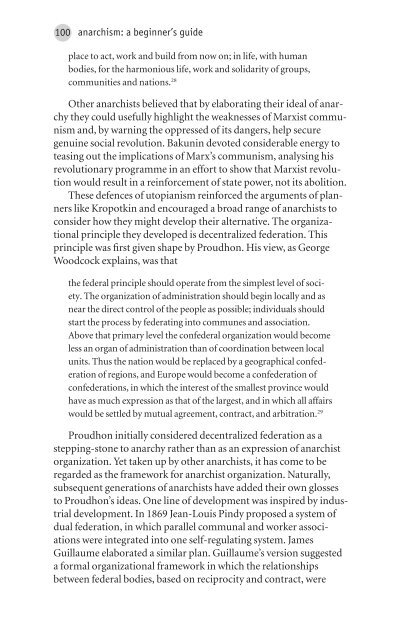o_195qg5dto17o4rbc85q1ge61i84a.pdf
You also want an ePaper? Increase the reach of your titles
YUMPU automatically turns print PDFs into web optimized ePapers that Google loves.
100<br />
anarchism: a beginner’s guide<br />
place to act, work and build from now on; in life, with human<br />
bodies, for the harmonious life, work and solidarity of groups,<br />
communities and nations. 28<br />
Other anarchists believed that by elaborating their ideal of anarchy<br />
they could usefully highlight the weaknesses of Marxist communism<br />
and, by warning the oppressed of its dangers, help secure<br />
genuine social revolution. Bakunin devoted considerable energy to<br />
teasing out the implications of Marx’s communism, analysing his<br />
revolutionary programme in an effort to show that Marxist revolution<br />
would result in a reinforcement of state power, not its abolition.<br />
These defences of utopianism reinforced the arguments of planners<br />
like Kropotkin and encouraged a broad range of anarchists to<br />
consider how they might develop their alternative. The organizational<br />
principle they developed is decentralized federation. This<br />
principle was first given shape by Proudhon. His view, as George<br />
Woodcock explains, was that<br />
the federal principle should operate from the simplest level of society.<br />
The organization of administration should begin locally and as<br />
near the direct control of the people as possible; individuals should<br />
start the process by federating into communes and association.<br />
Above that primary level the confederal organization would become<br />
less an organ of administration than of coordination between local<br />
units. Thus the nation would be replaced by a geographical confederation<br />
of regions, and Europe would become a confederation of<br />
confederations, in which the interest of the smallest province would<br />
have as much expression as that of the largest, and in which all affairs<br />
would be settled by mutual agreement, contract, and arbitration. 29<br />
Proudhon initially considered decentralized federation as a<br />
stepping-stone to anarchy rather than as an expression of anarchist<br />
organization. Yet taken up by other anarchists, it has come to be<br />
regarded as the framework for anarchist organization. Naturally,<br />
subsequent generations of anarchists have added their own glosses<br />
to Proudhon’s ideas. One line of development was inspired by industrial<br />
development. In 1869 Jean-Louis Pindy proposed a system of<br />
dual federation, in which parallel communal and worker associations<br />
were integrated into one self-regulating system. James<br />
Guillaume elaborated a similar plan. Guillaume’s version suggested<br />
a formal organizational framework in which the relationships<br />
between federal bodies, based on reciprocity and contract, were




